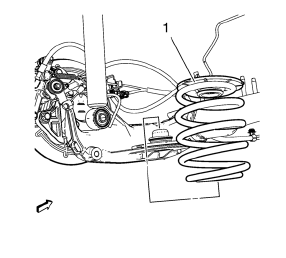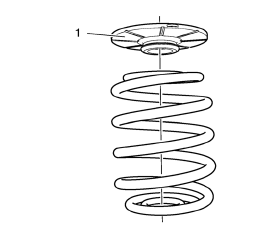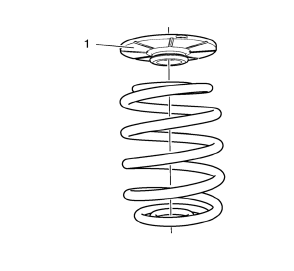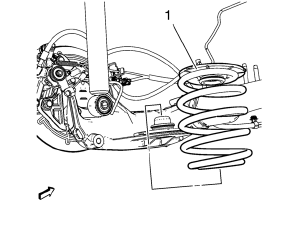Chevrolet Cruze Repair Manual: Rear Spring Replacement
Removal Procedure
- Raise and suitably support the vehicle. Refer to Lifting and Jacking the Vehicle.
- Support the rear axle with a tall jack stand near the shock absorber.
- Remove the lower shock bolt. Refer to Shock Absorber Replacement.
- Using the tall jack stands, slowly lower the rear axle in order to remove tension from the rear springs.

- Remove the spring (1).

- Remove the upper spring seat/jounce bumper (1) from the spring, while leaving the lower spring seat on the axle.
Installation Procedure

- Install the upper spring seat/jounce bumper (1) on the spring.

- Install the spring (1) making sure the lower coil is seated into the lower spring seat.
- Using the jack stands, raise the rear axle in order to compress the rear springs.
- Install the lower shock absorber bolts. Refer to Shock Absorber Replacement.
- Lower the vehicle.
 Rear Spring Insulator Replacement
Rear Spring Insulator Replacement
Removal Procedure
Raise and suitably support the vehicle. Refer to Lifting and Jacking the
Vehicle.
Support the rear axle with a tall jack stand near the shock absorber.
Remove the lower sh ...
 Rear Axle Replacement
Rear Axle Replacement
Special Tools
EN 45059 Torque Angle Sensor Kit
For equivalent regional tools, refer to Special Tools.
Removal Procedure
Raise and suitably support the vehicle. Refer to Lifting and ...
Other materials:
Remote Vehicle Start
The vehicle may have this feature that allows you to start the engine from outside
the vehicle.
(Remote Vehicle Start):
This button will be on the RKE transmitter if the vehicle has remote start.
The climate control system will use the previous settings during a remote start.
The rear defog ...
Service
This vehicle may have the new environmentally friendly refrigerant, R1234yf.
This refrigerant has a significantly reduced global warming impact on the environment,
compared to the traditional automotive refrigerant, R-134a. All vehicles have a
label underhood that identifies the refrigerant us ...
Warning Lights, Gauges, and Indicator
Warning lights and gauges can signal that something is wrong before it becomes
serious enough to cause an expensive repair or replacement. Paying attention to
the warning lights and gauges could prevent injury.
Warning lights come on when there could be a problem with a vehicle function.
Some ...
